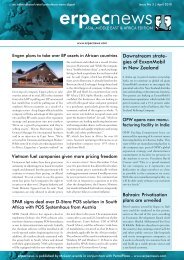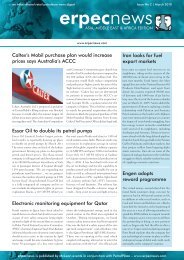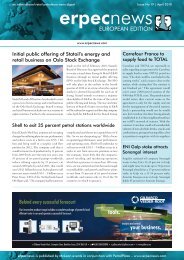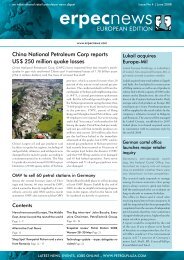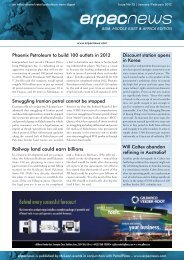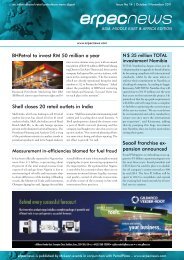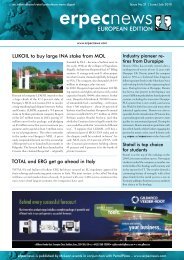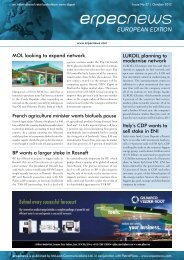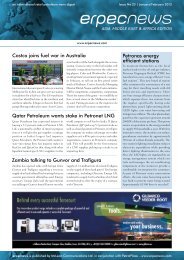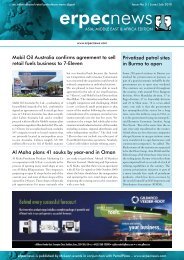Tanzania Oil companies want fuel testing Galp wants ... - ErpecNews
Tanzania Oil companies want fuel testing Galp wants ... - ErpecNews
Tanzania Oil companies want fuel testing Galp wants ... - ErpecNews
You also want an ePaper? Increase the reach of your titles
YUMPU automatically turns print PDFs into web optimized ePapers that Google loves.
should India regulate petrol prices again?<br />
In order to help the <strong>Oil</strong> Marketing Companies<br />
(OMCs) erase some of their losses,<br />
the Indian government deregulated petrol<br />
prices in June 2010. However the government<br />
still compensates the OMCs for selling<br />
diesel, kerosene and liquefied petroleum<br />
gas at government-fixed prices. In-spite of<br />
deregulation, OMCs like <strong>Oil</strong> India, HPCL<br />
and BPCL still have to get the government’s<br />
approval to raise petrol prices. As a result<br />
Petron acquires esso Malaysia<br />
Petron <strong>Oil</strong> & Gas International Sdn Bhd<br />
(Petron International), an offshore affiliate<br />
of oil refiner Petron Corp., has offered to buy<br />
an additional 35 percent of Esso Malaysia<br />
Berhad for 3.50 malaysian ringgit a share.<br />
Petron International under a “mandatory<br />
takeover” offered to purchase 94.5 million<br />
shares held by other stockholders of Esso<br />
Malaysia. “The mandatory takeover offer was<br />
due to elections the OMCs have been unable<br />
to raise petrol prices for the past 4 months.<br />
OMCs last raised petrol prices in December<br />
2011. Price of Brent crude has increased by<br />
11.06 percent since 1st January, 2012 which<br />
has resulted in significant losses for the<br />
OMCs. According to the oil ministry, OMCs<br />
are losing around 4.86 billion rupee a day<br />
on account of selling petroleum products at<br />
government-mandated prices.<br />
triggered by Petron International’s acquisition<br />
of 175 500 000 Esso Malaysia Berhad (EMB)<br />
shares, representing 65 percent of the voting<br />
shares of EMB”, Petron said in a disclosure<br />
to the Philippine Stock Exchange. Petron<br />
said the tender offer marked its entry “into<br />
the highly-attractive and dynamic Malaysian<br />
market and is a strategic opportunity for the<br />
company to increase its presence in Asia”.<br />
Leading downstream company by 2016<br />
ENGEN Ghana limited is targeting to become<br />
the leading downstream company in the sub-<br />
Saharan region by 2016. ENGEN is focusing<br />
on the downstream refined petroleum products<br />
market and related businesses. The company’s<br />
core functions are the refining of crude oil, the<br />
marketing of refined petroleum products and<br />
the provision of convenience services via an<br />
extensive retail network. ENGEN has pres-<br />
ence in 18 countries in sub-Saharan Africa.<br />
Managing Director, Engen Ghana, Henry<br />
Akoboah said “The vision of the company is to<br />
become the number one downstream company<br />
in sub-Saharan Africa. This means that we<br />
are going to increase our market share and<br />
our presence. That is the reason why we also<br />
acquired Chevron’s assets in seven countries<br />
to expand our operations in the sub-region”.<br />
south Korea expands ‘bargain’ gas stations<br />
South Korea plans to open more “bargain” gas<br />
stations throughout the country to help control<br />
inflationary pressure and lighten living costs<br />
for ordinary citizens. At an economic policymakers<br />
meeting aimed at stabilizing consumer<br />
prices, the finance ministry said up to 433<br />
bargain gas station will be set up increasing<br />
from 385 the number currently in operation.<br />
The bargain gas stations sell <strong>fuel</strong> products<br />
at lower prices than their conventional rivals.<br />
These stations can undercut rivals because<br />
they receive their <strong>fuel</strong> directly from state-run<br />
agencies at cheaper prices. The government<br />
said the presence of such stations helps lower<br />
gasoline and diesel <strong>fuel</strong> prices across the board<br />
through open market competition.<br />
zambia shortlists 14 <strong>fuel</strong> supply <strong>companies</strong><br />
Fourteen foreign firms among them Dalbit<br />
Petroleum and Kuwait’s Independent Petroleum<br />
Group (IPG) have been shortlisted for the<br />
two-year supply of diesel and unleaded petrol<br />
to Zambia. And nine foreign firms have been<br />
shortlisted for the supply of 1.4 million tonnes<br />
of petroleum feedstock to Indeni Petroleum<br />
Refinery over two years. The country is currently<br />
looking for firms to supply diesel and<br />
unleaded petrol side by side with the firm to<br />
supply 1.4 million tonnes of petroleum feedstock<br />
over two years. The tender constitutes<br />
for supply of finished petroleum comprising<br />
15 to 20 percent of the diesel and petrol that<br />
the country consumes. Sources said prominent<br />
bidders included Dalbit Petroleum of Kenya,<br />
Agipol Africa, Addax Oryxl, Trafigula, IPG<br />
and Kenol Kobil.<br />
sanctions boost business for Iranian tanker company<br />
Iranian oil stored at sea is building up due to sanc -<br />
tions which are proving a boon to its tanker oper-<br />
ator. Half of the large crude carriers owned by<br />
NITC are now storing oil instead of exporting it.<br />
latest news, events, jobs online – www.PetrolPlaza.com<br />
News – MIddLe eAsT, AFrICA & AsIA<br />
Local <strong>fuel</strong> retailers interested<br />
in Caltex assets<br />
Local players are flexing their muscles to<br />
acquire downstream assets of Chevron Corp.<br />
as the American oil marketing company<br />
(OMC) is considering disinvesting from Egypt,<br />
Pakistan and Australia, industry officials<br />
and analysts said. Chevron (Caltex brand)<br />
has recently announced it <strong>want</strong>s to sell off<br />
its downstream assets consisting of refining,<br />
marketing and retail sales outlets. Chevron<br />
(Caltex) has an extensive presence in Pakistan<br />
with a nationwide retail network consisting<br />
of 538 <strong>fuel</strong> outlets. Industry officials say Attock<br />
Petroleum (APL) and Byco appear to be<br />
the key contenders among existing players.<br />
Fauji Faoundation’s Fauji Fertilisers (FFC)<br />
is also considering acquiring Caltex operations<br />
in Pakistan as the company is actively<br />
pursuing its business diversification plan and<br />
has already ventured in the energy sector.<br />
essar <strong>Oil</strong> to produce<br />
euro-v grade diesel<br />
Essar <strong>Oil</strong> Ltd has commissioned a unit that<br />
will produce Euro-V grade diesel at its Vadinar<br />
refinery in Gujarat. The 4 million tons a year<br />
Diesel Hydrotreater Unit-I (DHDT-I) will<br />
upgrade diesel quality by treating the sour<br />
diesel streams, achieving reduction in sulphur<br />
as well as an improvement in the cetane index.<br />
The project will enhance the refinery’s<br />
capacity to 18 million tons per annum from<br />
current 14 million. The new unit will ensure<br />
that the diesel produced will be capable of<br />
meeting Euro V specifications. Essar <strong>Oil</strong><br />
has already commissioned the Isomerisation<br />
Unit, which was the first expansion unit to<br />
be commissioned, that gives the refinery the<br />
capability to produce gasoline of high octane<br />
rating and almost zero sulphur content.<br />
Nigeria imports of 4.8<br />
billion litres of <strong>fuel</strong><br />
The Petroleum Products Pricing Regulatory<br />
Agency (PPPRA) has issued 42 petroleum<br />
product marketers, permits to import a<br />
total of 4.8 billion litres of petrol in the<br />
second quarter this year. This will be the<br />
first open tender announcement since the<br />
partial removal of subsidy in January. Experts<br />
estimate that the country consumes<br />
between 20 and 25 million litres of petrol<br />
every day. Before the issuance of these<br />
permits, the country relied on exchanges<br />
of crude oil for petrol and other products.<br />
<strong>Oil</strong> majors like ExxonMobil and TOTAL<br />
as well as state-owned Nigerian National<br />
Petroleum Corporation (NNPC) are among<br />
the <strong>companies</strong> approved to sell petrol in the<br />
country, the PPPRA said in a statement.<br />
3



